On the Edge is the latest film from the Soska sisters. Whilst it is the sixth film that they have directed together, it is their third original creation following on from Dead Hooker in a Trunk and American Mary. Later this week On the Edge will receive its world premiere at FrightFest Halloween. It stars Aramis Sartorio as Peter, a family man who books himself into a thirty-six hour session with the sadistic Mistress Satana who seems more intent on making him suffer for his sins. Playing Mistress Santana is Jen Soska, with Sylvia Soska starring as Peter’s wife. It marks their first proper performances in front of the camera for a number of years.
The new project came out of nowhere, surprising fans when news dropped that not only were the Soskas making a new film, but also that it was in the can and ready to release. On the Edge was equally something of a surprise to the Soskas. Although the idea had been percolating within them for a number of months, it only came together fairly recently once they managed to secure funding. Shooting was completed in August and now just a couple of months later it is about to be unveiled to the world.
Ahead of the world premiere at FrightFest we spoke with Jen and Sylvia to find out more about this whirlwind production.
On the Edge came together pretty quickly; what was the inspiration?
Sylvia Soska: I have to blame almost turning forty, and also David Cronenberg. After we did Rabid, we were obsessed with him. I remember watching Crash with a group of friends and it’s an NC17 movie for a very good reason. The first graphic sex scene went on forever. I was blushing so hard. My friends were all, “Sylvia, why are you showing me this?” I was, “Okay, I feel like all of the work I’ve done until now is a little bit like Mary Poppins.” When you’re a young woman and you talk about sexuality, it becomes almost like an onslaught of people throwing or projecting their fantasies on you. I feel like I’m mature enough to have a conversation like this. David Cronenberg’s movies are his sexual fantasies and it made me think what would a woman’s one look like? Again, I blame David Cronenberg because I met him and we were sitting across from each other, and he said, “I’m 75 years old. This is the first time I’m going to do something uncensored.” And I just thought, “I should do that.”
The representation of the dominatrix character in film is very one note. They’re either the villain or the comic relief. On the Edge offers another side. Why was it important for you to give sex workers more agency?
Jen Soska: Every sex worker I’ve met is so nice.They’re such good people. They remind me so much of the Body Mod Community. I didn’t go out and think, “hey, I better save this group of people with American Mary, and do something for sexual assault survivors”. There’s a dehumanisation of sex workers, but I see them as sex therapists, especially when it comes to dominatrices. I actually became certified as a dominatrix, I learned how to do it. I find that when they have been portrayed previously in films, usually, it’s to promote an actor’s career. For example, they want to play the stripper because, “hey, I’m hot.” But there’s 12,000 ways to be hot without taking a profession, not really doing it justice, and then like making a joke out of it. These are people’s lives and they are always the butt of the jokes. They are always having this projection of people’s sexual dysfunction on them. As an identical twin, before I even knew what sex was, I’ve had people’s projections on me, before I even knew what was happening. The amount of times that somebody has come over and felt that they can touch me because I’m a twin, or grab me, or take a… and this is before I was a successful filmmaker.
I got to know Tommy Pistol, Aramis Sartorio, my favourite adult film star, and not just because of the adult stuff. I watched it and was like, “damn, this guy’s an amazing actor”. Then as I got to know him, and I got to know his friends, I got to know what they went through, especially the girls. It made me so disgusted because they’re such sweet kind people, and the way that most people see them is as the villain.
Sylvia: I think people always look at sex workers and they’re, “oh what a horrible person.” It’s a billion dollar industry and it’s the only industry where the clientele pretend that they aren’t customers.
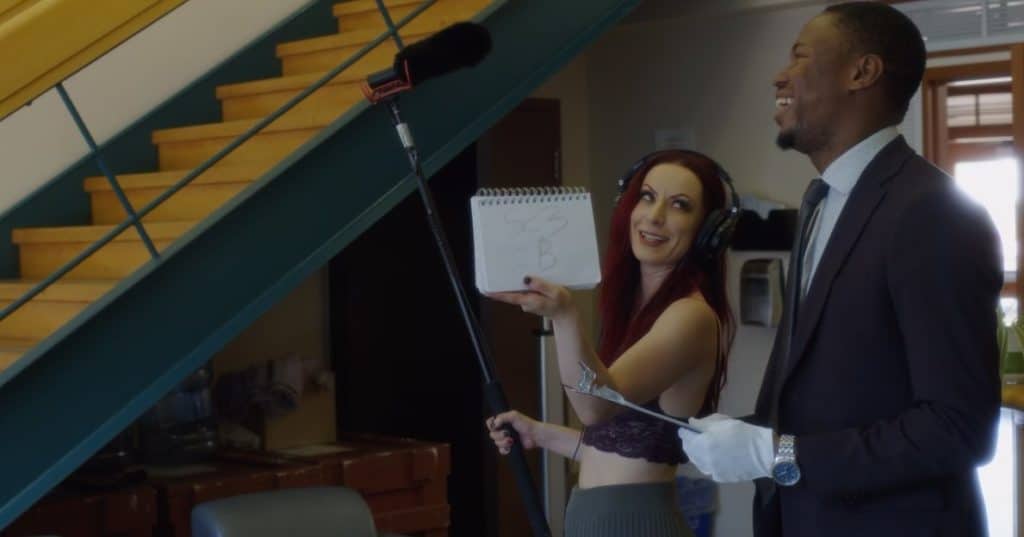
What made Aramis the one?
Sylvia: It was a long time coming. We wanted to cast Aramis in our movie Bob – an original monster movie, that was supposed to be the original, third original film. You’ve seen so many sex workers become wonderful actors, Traci Lords is one of the best. It’s funny because people still have this negative connotation and all I could think was, when we were doing this, is maybe we could do the same thing like with American Mary for sex workers, especially in kink culture.
Jen: I’m hoping this movie is for two people. For people who are in the kink scene and want a realistic portrayal of what they’re going through and why they’re doing it. It’s also for the people who would never ever ever ever do a little spank on the bottom, the people that wonder “why would someone even want to?” and hopefully On the Edge will educate them a little.
As Peter, Aramis has a lot of intense work. Peter requires Aramis to be very vulnerable and not just physically, but emotionally.
Jen: We pitched the movie to him very lightly in January. We had this idea last October. We were watching Hard Candy and wished it was a domination session where you find out something about the person. In a S&M situation it could be, “okay, well it’s really scary, but everyone’s on the same page”, and then of course you get to a point when they’re not on the same page anymore. Aramis, if you’re a fan of his films, you already know that he’s usually in the other position. So there was a lot of discussion where I was, “you do tying up, you do bags over the head, you do this,” and he would reply “yeah just not me. I’m usually you.” We talked about it and he has such a feeling that people don’t like him because of what he’s done. For people like me, he’s Spider-Man. He’s the Tom Hanks of adult films, and then other people are very, very cold and cruel.
I just wanted to make sure that he’d be as comfortable as possible. Although I will say that I did start with the meeting scene because I wanted to set the tone. He’d never acted with me before then. I talked through the scenes obviously, but I will say there was an element of surprise. Like, I would say, “I’m going to have a knife here and it’ll never come anywhere close to you. Don’t worry, you’re going to be safe, but it will be close to the camera.” Also, the nose against the door scene we worked on, “I’m going to take your belt off.” but I also said, “I’m going to come in close for the camera and I’m going to talk in a mean voice that you’ve never heard me speak in before.
Sylvia: We’ve been friends for over ten years and we’ve been trying to make movies with Aramis for so long. He was part of the Massive Blood Drive that we did. He directed a segment and acted in that, we even got him approved for Bob… and then Covid happened. I told him about On the Edge, then when we sent him the script. I didn’t hear back from him right away. I thought he was going to say no. Then we had some calls about it, and he talked about Peter and how he saw the character. A lot of himself got into the script that way.
Thank God he has the experience he does, because I remember there’s a scene that…I decided to be almost 40 years old before I did a scene that was this style of explicit. I remember being so nervous. I went over to talk to him and he was so cool. He was like, “here, here’s how we’re gonna do it” I was blushing. He and his partner, Nicole McClure, did a lot of private study before every day. I think he stayed in that character. He was also staying in the location that we were shooting in. It wasn’t until we were wrapping up that he said, “I feel really messed up from being in here.” I feel like we did Black Magic here. We summoned a God and then were like ‘sleep here every night. Okay, we’ll see you in the morning, don’t die’.”
Jen: He almost did feel like it was his Purgatory though. He feels that now that he’s been on the other side, the receiving end, that it’s almost , “I’m sorry that you don’t like me, but I’m not at all the person that you think I am. Sometimes I’m here. Sometimes I’m there, but the person that I really am is still for you to discover,” He’s the sweetest guy in the world. I’m not just saying this because he is comfortable with sexual content and nudity, but I don’t know any other actor that could have done that.
Sylvia: Emotionally, no. He remembered stuff from his own personal life while he was doing the script. That was really beautiful that he was able to share that. Even now I get a little verklempt thinking about it because a lot of the tears you see are real. When you get an actor to feel safe enough to do that… I mean,[to Jen] even you, when you did that performance, it was just really beautiful to see. I think a lot of people are going to think, “oh this is going to be a beating the shit out of movie” and then you see these few moments and it’ll be, “oh fuck, they’re humanising people again. Those Soska’s, they’re humanising everybody!”
If I could hire a sex worker for every movie for the rest of my life, I would do that. They have such a can-do attitude. It’s like a secret cave of talent. Most people question your decision, “they’re good?” and then they watch it and are immediately, “holy shit, where did you find that person?!” Literally, Aramis kept telling me he wasn’t going to hold anything back and I kept watching it and thinking no you didn’t sir. There’s so many times we’d be doing a scene and I would say, “don’t worry Aramis we’ll never ask you to do a movie like this again. I’m pretty sure this is your Martyrs, this is the one they’ll watch and be “he’s good, let’s make him just do a tenth of this.”
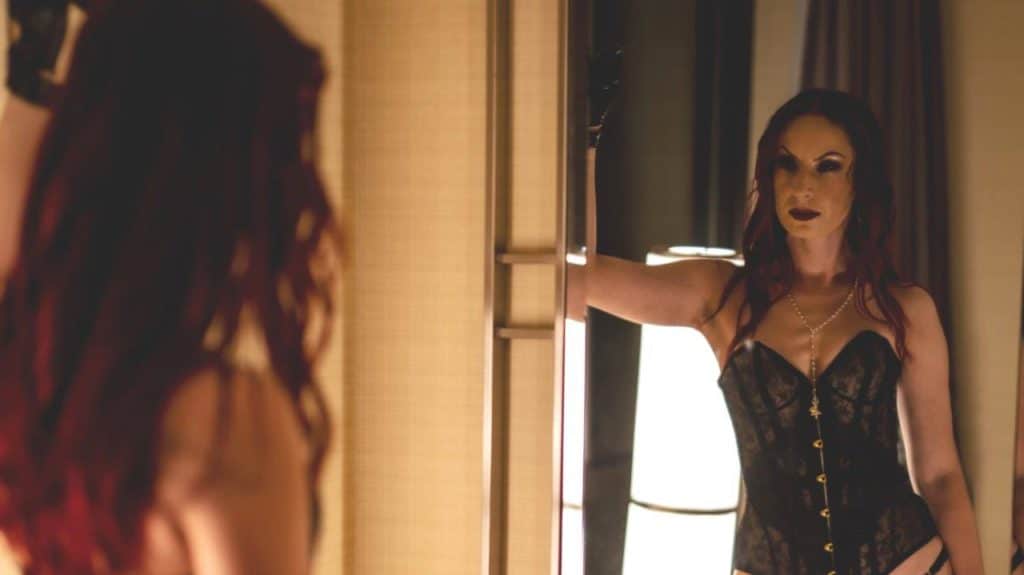
You’re both back in front of the camera; was it good to be back in the spotlight?
Jen: I always want our actors to be comfortable. I have a rule on set that we would never ask an actor to do anything that we wouldn’t ourselves. Before we fell into directing, we always wanted to act. We spent years acting. When you were a young identical twin girl around the time of the Olsen twins. nobody said, director, producer, CEO, they said, “you’re cute, go do stuff at the exact same time.” I also didn’t have the time to go back and forth on comfortability. I wanted to play the role so that there’s never going to be an issue with “was Mistress Satana comfortable?”
I also wanted to be more sexual than I’ve ever been in a movie so that I would be in the same place as a sex worker. I’m a certified dominatrix, I am a sex worker. You’ve only seen it in the movies so far, but I am available for bookings. I wanted to be on the same level, because how can you be loving and respectful to me, but you look at someone who does it for real and you view it as disgusting or nasty?
Sylvia: Also knowing Jen, this world has been waiting for you for many years. It’s just your personality…
Jen: I’m more of a Morticia Addams. I’m quiet and I rule with quiet, dark magical power. This was like going on vacation. I loved it. I forgot that I loved acting so much. It was a lot of fun to be this character that was so powerful. I quickly understood why actors get so hungry for it. I got to be so beautiful, powerful, and cool. I fell back in love with it man. I loved it.
Luna Wolf is an integral part of the production. She’s a producer, the editor, the cinematographer, even the chef. You met her first at FrightFest; how did the relationship form?
Sylvia: We met Luna when we’re doing press for Rabid at FrightFest. When you do press for a movie it’s just crazy and we hit it off right away, and I think she actually ordered a bracelet from you Jen? And that’s how you guys started talking?
Jen: When we were at Fright Fest in 2019, Sylv and I were having so many death threats and horrible shit because that’s just what happens when you’re tearing up Cronenberg.
Sylvia: When you rewrite Cronenberg and Black Widow, people get pissed.
Jen: I love FrightFest, but nobody had any idea what was going on with me and nobody could read that. I was like, “am I gonna die here?” and I had such a human moment with Luna. She was one of the interviewers, and she asked me how I was doing and I talked to her and we had a real conversation. I never thought I’d ever see Luna again, I just thought she was this amazing British gift, this amazing girl.
Then over the pandemic I decided to be a really good witch. I make gemstone bracelets and malas and I’ll do a little spell for anybody. Luna had bought a bracelet and it was the only bracelet that never showed up. She reached out about that and we started talking. We started really talking. She told me what she had been through, and I told her what I’d been through, and I thanked her for being nice during FrightFest. Then we became such good friends. I heard about the UK and the stabbings and stuff that you have there, and I was like, “Luna, you feel more like a Canadian girl, you should move over, you should come to Vancouver Film School. You’re already so talented, but just learn how we do it in Canada.” She came over. We became such good friends. She’s our neighbour now. We have coffee in the morning and fill books with ideas.
Sylvia: Luna is the catalyst of this entire project because she introduced us to the financing producer. We all had dinner during the pandemic and we were talking about how hard the times are going to be coming forward and what we should do. We realised we should start doing movies that talk about people that aren’t being spoken about, stories about outcasts. We pitched a few ideas and our producer said, “On the Edge, that’s amazing. That would be a great movie to do.”
Luna’s an editor. She’s a DP, she was our consultant, and she was also a producer because she put the project together. It was the most amazing experience. Jennifer and I are always trying to find artists and elevate them, give them opportunities. A lot of the time in giving a quote, or just showing up on set, you’re not really helping somebody. You don’t really know that person and then you’re not really mentoring them to the point where they can get somewhere. So it was really awesome to get to work with Luna. She’s insanely talented, but she never got the opportunity to shoot like this. She never got the opportunity to cut like this. She’s never finished a whole feature film like this. It was just one of the most amazing experiences.
I think Luna found her calling in producing, which is so funny because like when we did Dead Hooker in a Trunk we thought, “we’re gonna be stunt actresses!” and then after we were, “I like being in control of the story”. I keep pushing Luna towards directing, I know she doesn’t want to, but there’s not a lot of stories that have lesbians featured in a positive way from actual lesbians. It is always dudes writing voyeuristic fantasies of what they wish girls would do for them.
Jen: I couldn’t say enough good things about Luna. I always wish that there was like a trophy you could win at FrightFest, but Luna is the trophy. The trophy that we took away. Watch out FrightFest, we’re coming back to steal more of your talent.
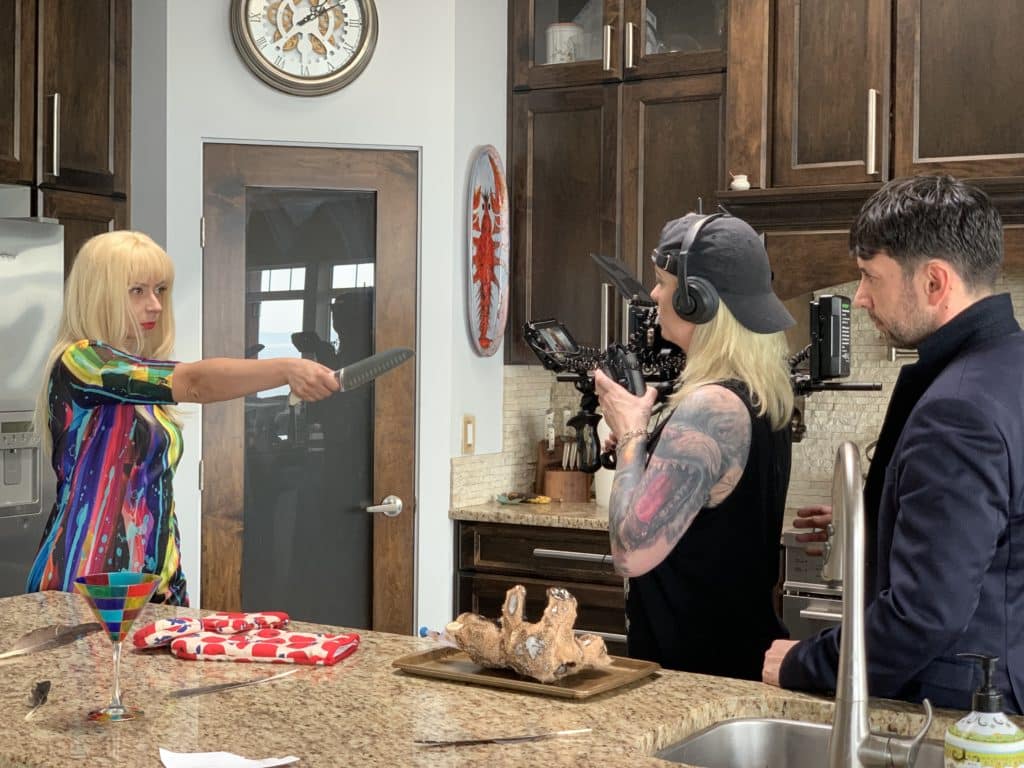
For a lot of On the Edge it was just the four of you (Jen, Sylvia, Luna, and Aramis) how do you think this intimate number helped the project?
Jen: We only had four crew members at any given time because of intimacy and Covid. I even had a mantra – “don’t catch Covid. We have our tests all taken care of, but if you motherfuckers catch it, we’re all going to go down together.” – that was the rule.
Sylvia: For intimacy coordinator, you are in your underwear and Aramis was naked almost every day.
Jen: I will say that Aramis, we always made sure he was respected, but I walked around like I was Mistress Santana. As soon as people came in I said “hi, good to see you.” They’d gasp.
Sylvia: You set the tone.
Jen: Because Mistress Santana is like “worship me. I’m beautiful”, and Jen Soska is, “thank you. It’s nice to meet you.” It was good to play my other half.
Part of Mistress Santana’s look is these wonderful heelless boots at one point; how on Earth did you walk in those?
Jen: I did take some lessons. Part of my Mistress Santana routine was 100 sit-ups and 100 squats a day. I started with 50 for the first week, and then I just went as hard as I could. Not only did I look as I hoped I would on camera, when I finally got the hoofwear on, the squats really, really helped. Walking in them, I used muscles I’d never used in my life. Only now has the one in my left leg stopped twitching. There’s a muscle right near the bone that I found I was using and it was in such excruciating agony. I was like, “I can’t even massage it, but it was worth it”. It was actually the wig that was really painful. The heels I don’t mind because being a twenty-something year old Soska sister, we wore heels for mountain climbing.
Sylvia: We were dumb, determined, and stubborn.
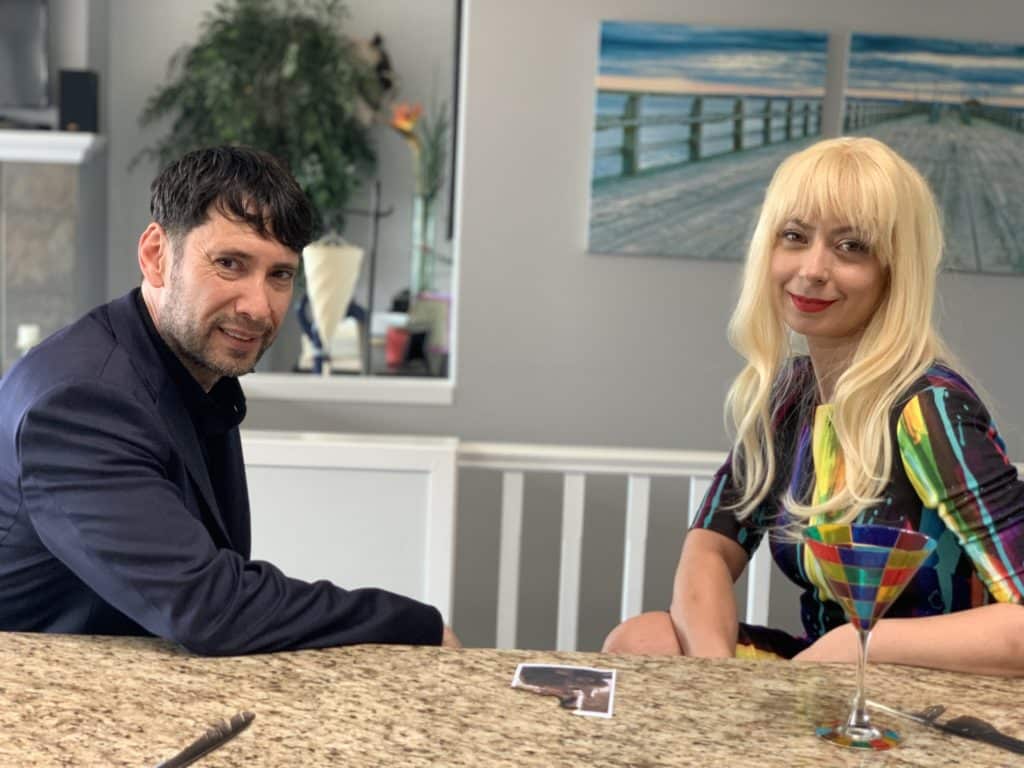
With On the Edge you had a great deal of control. Now that you’ve had so much ownership, do you think you’ll ever give it up?
Jen: That’s tough to say because our producers now are oddly very supportive of us creatively. I used to work with producers that would say, “change this word, I don’t like it” or, “change this name, it was my ex-wife’s.” Now I work with producers who say, “do you think that you could incorporate this painting from the 16th century? I’m just sending it to you now. I just want to know if there’s a mood or if there’s something you can do.” That’s how I speak. That makes sense to me. When someone says, I don’t like the word, or I don’t like this, or I hate this, you’re not in the business of art, you’re in the business of hate.
Coming back to the answer, your question, if I did come up against that…I’ve been poor more than I’ve been super successful. I’m comfortable with my integrity and my poverty. I don’t think I would ever tell somebody else’s message. There is much divisive ideology masquerading as art right now. So many people had their own passions and their own struggles, and that used to be what people would voice in their art. Now politics take over everything.
This is a story that I think was so overdue. I don’t think another filmmaking team or director would make it with this kind of sensitivity and compassion. There was a version we wrote where Peter was not who you thought he was. It got insane. But as we discussed, what we wanted the takeaway to be from the film, it changed. We really want people to come away with empathy. Even if someone has these kinky feelings on the inside, they’re not bad people. They’ve probably had something bad happen to them and they need to bring that energy out. I think an S&M session is a thousand times better than therapy. Therapy is a lot like a first date where you think how do I talk to this person? In an S&M session you’ve already said, “this is what I need. This is definitely on my no list” and you can stop at any time and talk about it. When something is done to you, I don’t know if talking gets it out of you.
Sylvia: I feel like Jennifer and I are really blessed. It wasn’t always a situation where we could have an artistic idea and be fully supported by the people that we are working with. One such example is when we worked on See No Evil 2. There’s a scene that had a blowjob written in, and we were like, “no, this guy’s going to go down on his girlfriend.” We had arguments for three months leading up to that. Eventually we won it, but we kept saying, “I’ve seen so many blow jobs. Why can’t the girls have some fun?” Their response was, “that would be gross,” and I said, “ask your wives, ask them if they think it’s gross,” and eventually, thank God, we got our way.
Now we’re working with Cathasaigh Productions, which is an independent Canadian horror studio. They are so gracious and they are so kind. This was the first movie we did of a long laundry list of movies. Jennifer and I are even planning on teaming up with Astron 6 for the very first Twisted Twins / Astron 6 co-production. I think it’s something that we can keep doing independently. Jen and I are also incredibly blessed to be working with Ted Field at Radar, he co-founded Interscope. He’s one of the most successful American producers in all of history and we’re working on a movie called Unseen. We also have David Cronenberg’s producers. They’re all so gracious to work with. Working with geniuses that are so well established, and I feel like I’m in this weird position… We’re making these cool independent movies and these multi-million-dollar high-concept horror movies.
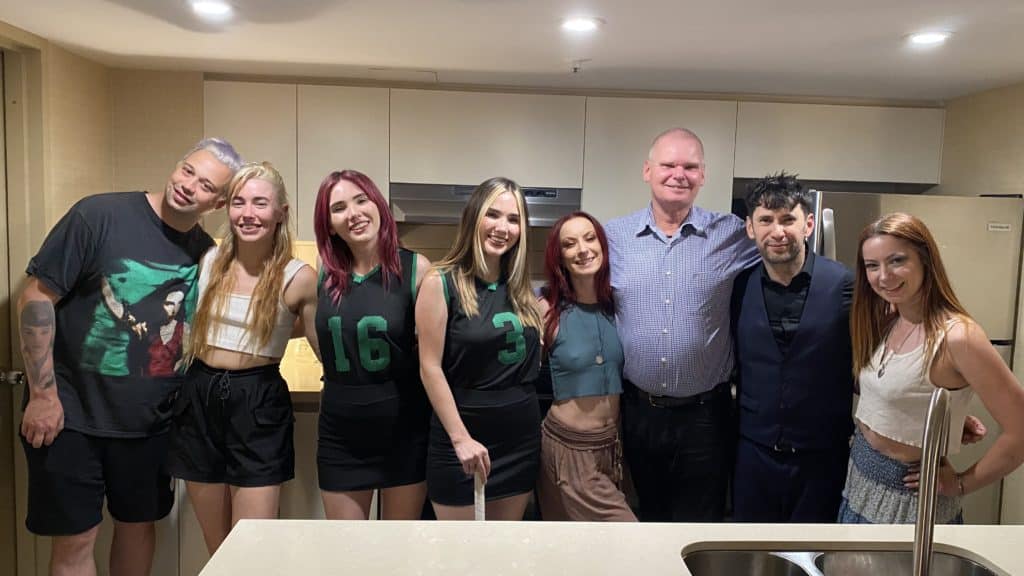
Jen: Are you familiar with the phrase ‘give one to the town’? After Dead Hooker and American Mary, because they said Dead Hooker isn’t a real movie and American Mary was too upsetting a movie, they said, “you gotta give one to the town”, and I wondered, “what does that look like?” They said, “working with a studio someone’s heard of”, and I thought, “okay, Lionsgate and WWE.” So we did See No Evil 2. Then they said, “it’s too commercial, and also, you just do horror movies with girls. That’s not that impressive.” So then we made Vendetta which is basically two testicles turned into a film. People still didn’t watch it and so we were told, “that was too girly.”
Finally, we came to Rabid and we just got this very weird email saying, “you want to remake Rabid?” and we said yes. Long story short, I was very concerned by the people who had the rights to Rabid. I thought, “they’re going to make it regardless. So let’s just throw ourselves in front of the train and protect David.” Then when I finally met Mr. Cronenberg, he already loved us. He admired us, we’d met his children. He respected our body of work and he said, ” I would have had lunch with you anytime.” I told him about our hardships and he said the film ended up where it was meant to be and he thanked us. The last one I gave to the town was, I was giving one for David. I’ve been trying so hard, and I keep waiting for the town to reward me with, like, a Deadpool, or a female fronted, whatever… man I couldn’t even get an episode of Jessica Jones.
Sylvia: That’s because you went and pitched The Punisher and they got scared.
Jen: They brought us in to meet just so they could say, “we met with the American Mary directors”, but they wanted to do something where she hated her rapist. We didn’t want to do that.” I feel that I’ve given many to the town. I will alternate, I’m still available for money as every artist is. But I’m always going to be working with Cathasaigh. Our goal is to do one of our independent productions every year and that way we are not only keeping control of our creative and our narrative, but we’re doing what most studios don’t do. Instead of hiring like, “hey, here’s a comedian, do you want to be a director?” or “here’s a famous actress, you want to be a producer?” We’re looking for the people who have been struggling and killing it, like Astron 6.
Sylvia: And the Aramis Sartorio’s of the world.
Jen: Here is this untapped talent. Maybe you can’t see it because you only see dollar signs, but I see souls, I see goodness, I see legends. I want to be a Canadian Blumhouse where people are like, “oh I gotta pitch to the Soskas because I got this under-a-million-dollar insane thing that only they’ll understand.”
Sylvia: Well you let the cat out of the bag a little bit. We’re also planning on stepping back and being a full service studio. So when there’s artists that have an idea, instead of being like, “oh well, you suck your idea didn’t work out. You didn’t know how to pull it off.” You put them around people like us that are like, “I know how to do it multi-million-dollar, and I know how to do it for five bucks. Let’s figure it out and let’s make it happen.” Especially in Canada because we’re such a service industry, it would be nice to build up our national cinematic identity. So when you think what’s a Canadian movie? You’re like, “oh those weirdos. Oh God. You know what those weirdos do, you know?”
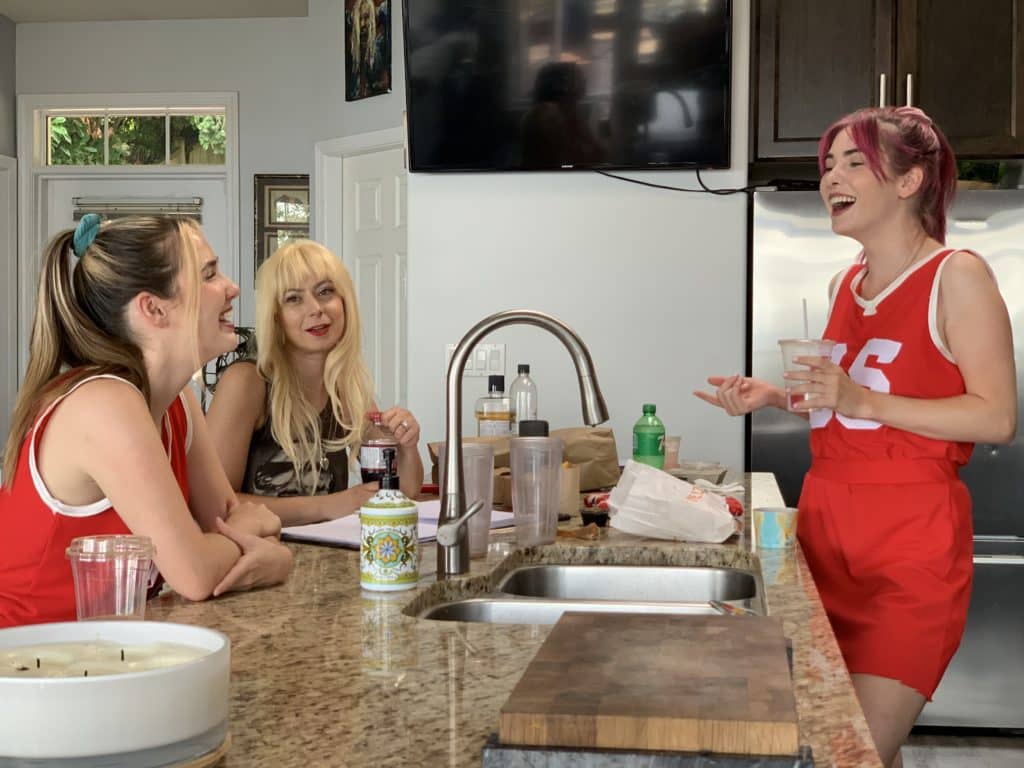
On the Edge gets its World Premiere at FrightFest, was FrightFest always the festival you had in mind?
Jen: Yes. I thought I was going to try and do the Glasgow one in February, but Halloween is Christmas for horror. There is no film festival that people are as kind, as gracious, as honest and genuine as FrightFest. I remember before American Mary premiered to 1400 seats at 11:00 in the morning, completely sold out. We were told, “they’re very honest. So, if someone comes over after and says, ‘hey, it’s a bit shit.’ Just know that they’re going to say it to your face.” But they also said, “if they like it, it’ll make your entire movie for you, it’s a career making moment”, and it was because the horror fans between FrightFest and Monster Fest, which we’re also coming back to, they just did so much for us. I’ve never been treated like that on North American soil, they really put in the effort. I talk to the four horsemen of FrightFest in between FrightFests, so I know they actually care about me as a human, which is nice.
Sylvia: It’s appropriate because it’s our third original film. It’s our third time going to FrightFest. It’s our sixth feature film, but forget those other three. You see so many young artists and they release an album or something without saying it. So Jen and I were like, “we should do that with the new movie, we should just announce it, just like drop it, and just be like this is exciting, this is something we do now.”
Jen: Yeah, I wanted to present something out of Covid other than bitterness.
What are you hoping the reaction will be?
Jen: There’s been so many films where a girl is sexually abused, or naked and shivering. Then she ends up in a relationship with the guy after because she’s like, “oh I like the abuse.” I just wanted to turn that completely on its head and because I’ve seen so much 50 Shades of Grey shit. I watched this and it’s like my own version of Secretary. It’s very pro kink culture and it explains the psychology of people and explains the why.
Sylvia: I’ve watched the movie with girls and guys and they have very different reactions to it. Men are like, “oh my God, holy shit, what the fuck?!” and girls just have this maniacal laughter.
On the Edge will have its World Premiere at FrightFest Halloween on Saturday 29th October.
Kat Hughes is a UK born film critic and interviewer who has a passion for horror films. An editor for THN, Kat is also a Rotten Tomatoes Approved Critic. She has bylines with Ghouls Magazine, Arrow Video, Film Stories, Certified Forgotten and FILMHOUNDS and has had essays published in home entertainment releases by Vinegar Syndrome and Second Sight. When not writing about horror, Kat hosts micro podcast Movies with Mummy along with her five-year-old daughter.

Latest Posts
-


Film News
/ 7 days agoTrailer: Apple Original ‘The Gorge’ with Miles Teller and Anya Taylor-Joy
Apple Original Film The Gorge has just got itself a trailer ahead of a...
By Paul Heath -


Interviews
/ 2 weeks ago‘The Last Video Store’ Co-Director Tim Rutherford discusses the film
Co-directors Tim Rutherford and Cody Kennedy have spent a decade creating their feature debut,...
By Kat Hughes -


Film Festivals
/ 2 weeks ago‘The Last Video Store’ team Cody Kennedy, Josh Lenner & Kevin Martin discuss the journey of their film
Having debuted in the UK at 2023’s FrightFest Halloween, it has taken a little...
By Kat Hughes -


Home Entertainment
/ 2 weeks ago‘Strange Darling’ UHD review: Dir. JT Mollner
THN first caught JT Mollner’s Strange Darling back in 2023 as part of Fantastic...
By Kat Hughes











